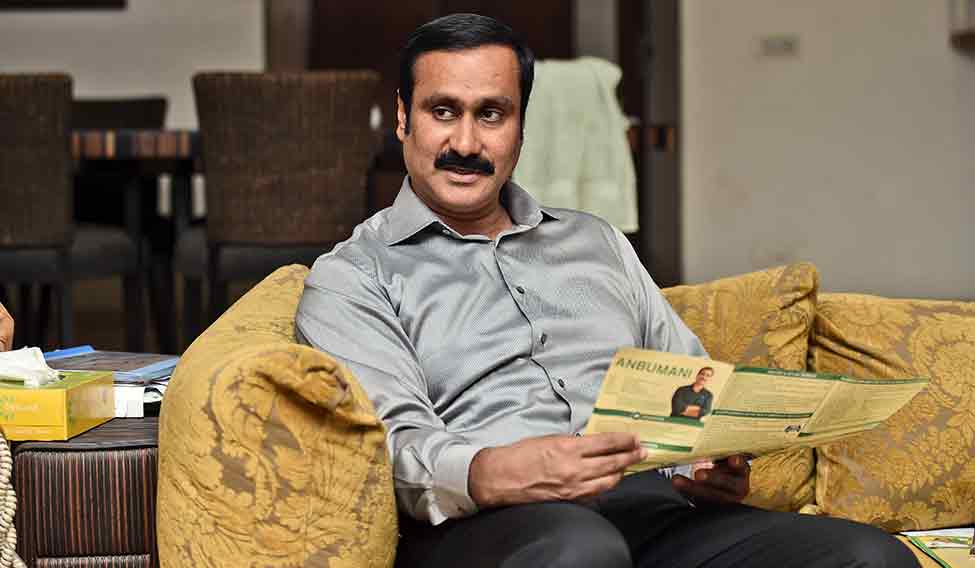It was a year ago that former Union health minister Anbumani Ramadoss launched the assembly election campaign for the Pattali Makkal Katchi, borrowing liberally from US President Barack Obama’s “hope” and “change” theme. Although the tagline of his campaign—“maatram, munnetram, Anbumani” (change, progress, Anbumani)—was trolled mercilessly in the social media, Anbumani has been steadfast with his message, making it clear that his party would no longer talk about caste, community, race or language.
THE WEEK caught up with Anbumani in Chennai at a meeting organised by the PMK for doctors and medical students. Dressed formally in a grey shirt, black trousers and shoes, he apologised to the participants for being late. A trained doctor, who was the architect of the National Rural Health Mission, Anbumani listened intently to suggestions and answered questions about his plans for the medical fraternity. “In the past ten years, maternal mortality has come down by 50 per cent and infant mortality by 55 per cent. The NRHM has worked wonders,” he said about his pet project. “There are many good health care models across the world—in Cuba, the UK and in France. I like the French model,” he said. He also spoke about his rapport with Bill Gates and other renowned personalities and how this would help him in working out foreign models regarding development.
As far as governance is concerned, Anbumani said he was against liquor and freebies. “We will do away with these two and give the people four: free health, education, employment and agriculture.” And, unlike his father, S. Ramadoss, the founder of the PMK, Anbumani is against allying with the DMK or the AIADMK. His decision to take on the two Dravidian parties is seen as one of the boldest steps in the 26-year history of the PMK.
“The people of Tamil Nadu want a change. Fifty years of the DMK and the AIADMK are enough and the people want a credible alternative. This is where we fit in,” he said. But didn’t he lack the charisma of Karunanidhi, Jayalalithaa or Vijayakanth? “I am not from the movie industry,” he said. “Others are from the previous generation. Youngsters look at me as the promising candidate. This is my advantage.”
Anbumani does not like the impression that he is influenced by his father. “I have my own ambitions for the people of the state and my father doesn’t influence me anymore,” he said, reiterating the point that Ramadoss had not interfered when Anbumani was heading the health ministry. “He never came to Delhi even once to tell me what I should or what I should not do as health minister.”
Yet, the father retains considerable influence in the party. At the news conference convened to release the party’s election manifesto, it was Ramadoss who stole the show. “I shall explain it first, and then you speak,” Ramadoss told Anbumani, taking the microphone to answer a question on the feasibility of free education.
The 146-page manifesto, which seems to have a solution for everything that ails Tamil Nadu, may not be enough for Anbumani to win the chief minister's chair. The PMK, which was born as a movement of the Vanniyars, a dominant backward caste—to resist dalit assertion in northern Tamil Nadu—still finds it difficult to eschew the caste image. Born in 1989 as Vanniyar Sangam, the PMK has largely relied on the exclusive support of the Vanniyars, who constitute nearly 18 per cent of the total electorate in Tamil Nadu. In the 2014 Lok Sabha elections, when Anbumani contested from the Vanniyar stronghold of Dharmapuri, caste conflict was at its peak after the murder of dalit youth E. Ilavarasan. It only reminded the electorate across the state of the PMK’s long-held caste prejudices. Ramadoss, for instance, has had a history of opposing marriages between upper caste Hindu girls and dalit boys.
Journalist R. Ramasubramanian said, despite the proclamations of the PMK, it basically remained a caste outfit. “It is looked upon as an anti-Dalit party, which reaped dividends in the 2014 Lok Sabha elections by exploiting the local conditions in Dharmapuri. The senior Ramadoss has a more aggressive anti-Dalit stand, whereas the junior is a polished guy. They have no understanding of the socio-economic conditions of Tamil Nadu. At a time when honour killings are on the rise, the PMK's manifesto is totally silent on the issue.”
Anbumani does not like being queried about the PMK's caste affiliation. When asked whether the party has left behind its caste-based ideology, he said, “This is a mischievous question. Ours is not a caste-based party. It is a party that is spread across the state and we are not for or against any community.”
Still, Anbumani has chosen to contest from his party’s fiefdom, the Pennagaram constituency in Dharmapuri district, where more than 35 per cent of the electorate are Vanniyars. Anbumani's agenda seems clear enough. He has chosen to go it alone this time, eyeing a major role in the 2021 elections, which could enable the PMK to lead a front.








